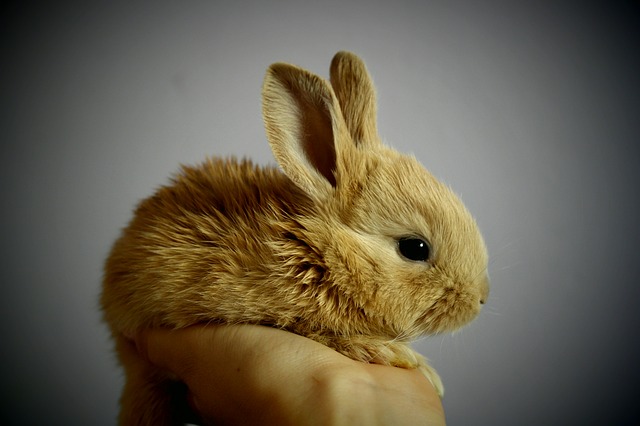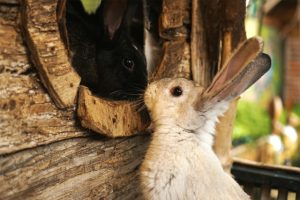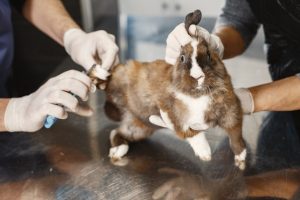We get it. Rabbits are adorable. Everybody loves them, and how couldn't they? More and more people want to have a rabbit at home and adopt them as pets, but just like other animals, they don't come without their usual troubles. Rabbits are prone to a wide array of health problems. And since owning a pet rabbit is a long term commitment given their quite long lifespan, it's important to know which are the most common rabbit health problems.
Some diseases and affections are more likely than others to happen, so it's important to know what they are and which are their signs and symptoms in order to prevent or treat them according to the situation. So let's find out which are the most common rabbit health problems.
Contents
The Most Common Rabbit Health Problems
Ear Mites
Ear mites are tiny arthropods that live inside the ears of both people and animals and they're the most common infection seen in cats, but rabbits are also prone to get it. Especially with those big flappy ears of theirs, which may not be too clean all the time, making it the perfect territory for these mites.
When inside the ear canal, ear mites feed off the wax and oils that the ear produces, making it irritating and itchy for your rabbit. They often scratch and shake their heads to get rid of the trouble, but without any result. A rabbit ear infected with ear mites has dark, crust-like debris.
If left untreated, ear mites can cause further problems, such as fungal or bacterial infections. The good side is that ear mites are easy to prevent and treat. The bad side is that bunnies can take ear mites very easily from an infected rabbit, from playing outside and even from us, if we've been handling another animal, such as a cat, which was already infected. A veterinary will know exactly if your rabbit has ear mites, but you can also spot them with naked eye sometimes.
Dental Problems
Unlike other animals, a rabbit's teeth will grow continuously throughout his entire life, and this is what causes the most common teeth problems in bunnies. Overgrown teeth.
Normally, when into the wild, rabbits will chew on a variety of plants and wood to keep their teeth trimmed, but at home, they might not have these options. You're the one who needs to provide your furry hopping friend with something good to chew on. You may not want that item to be your newly bought furniture, therefore you've got to provide him with special items made for rabbits to chew on and trimm their teeth.
If they don't have their teeth properly trimmed and they become overgrown, that may prevent them from eating and can even end up starving.
Overgrown molar teeth will create an impediment for swallowing and chewing. Overgrown front teeth (the incisors) can start curling into the cheeks of the rabbit, making eating a very painful process for them. Teeth that have abscesses are also painful and usually need to be removed for the infection not to spread.
Hairballs
Hairballs are common problems in animals with - you guessed it - a lot of fur. Fur can be ingested while grooming or along with food, and since the body cannot process it, it tries to eliminate it, but it usually gets mixed up with other food leftovers and often gets blocked somewhere inside the body, growing more and more and obstructing food from passing through the gastrointestinal system.
Unlike cats, rabbits don't regurgitate, and that makes hairballs a bigger problem to your bunny, growing and accumulating inside his stomach.
The prevention of hairballs includes regular brushing of your rabbit, enough clean water for them to drink, a proper diet and a lot of exercise. There are also other means, such as enzyme tablets, to get rid of the hairballs. The ultimate resort is surgery.
Abscesses
The abscess is a collection of pus built up in the tissue of the body of a rabbit. While they're often related to teeth problems, abscesses are also found in other various parts of the rabbit's body. Dental disease is the more often culprit of abscesses but they can be found inside other organs, or inside the skin tissue, making it a very hard to treat affection.
The bacteria that is found inside an abscess is one that doesn't need oxygen to survive, thus making treating the affection a lot harder than other diseases.
The usual method for healing abscesses is through the use of antibiotics, but cleaning out the abscess is also a good means to do it, provided that you can find it in the first place. Pain medication is also needed in the treatment, and vets will usually prescribe it to rabbits who suffer from abscesses.
When found, this disease needs to be treated, as it's a serious one and won't go away on its own.
Bumblefoot
Despite its funny name, bumblefoot is a common health problem in rabbits and can prevent them from walking normally or even walking at all. It's usually seen in rabbits that are obese or don't move around and exercise too much, in those that sit in dirty bedding or their litter boxes, or those who have a rough surface to walk and sit on.
Bumblefoot is a bacterial infection and inflammatory reaction. It's painful and requires treatment through antibiotics, pain medication, special diet and corrective bandaging.
Conclusion
These are only some of the most common health problems seen in rabbits. In the next part of this post we'll talk about other common diseases and illnesses that rabbits get, what they are, what are the symptoms and how can they be treated.






